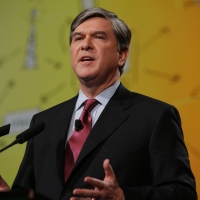NAB 2010: Smith: Broadcasters Aren't 'Spectrum ATM'

The smarter way to stay on top of broadcasting and cable industry. Sign up below
You are now subscribed
Your newsletter sign-up was successful
NAB Show 2010: Complete Coverage From B&C
Calling the FCC's National Broadband Plan the "great
spectrum grab," National Association of Broadcasters President Gordon
Smith told a broadcaster audience Monday (Apr. 12) in Las Vegas that the
spectrum reclamation portion of the plan was an example of "unnecessary
government intervention."
In a gloves-off keynote speech to the annual NAB convention,
according to a copy of his prepared remarks, Smith told the
audience that broadcasters were not a "spectrum ATM," and that
the government needed to do a thorough inventory of where the spectrum is, who
has it, and how it is being used, and to look at compression technologies
before squeezing broadcasters out. "To put it simply, this spectrum
reallocation is bad for consumers and bad for broadcasters," he said.
"It's not voluntary as originally advertised."
Smith said the FCC plan does not recognize the lifesaving or
lifeline values of broadcasting. "The sad truth is that the people who
would be most hurt by the new broadband plan are the disadvantaged and the
elderly. Fifteen percent of households rely exclusively on free, over the air
television. And that number appears to be growing, post-DTV transition."
Gordon signaled in interview with B&C last week that he was going to be tough on the plan, which
he has likened to an offer from the Mob that carries an implicit threat.
Smith pointed out that the industry already gave back almost
a quarter of its spectrum in the DTV transition [a transition he said
broadcasters' had spent $15 billion to make], "and they [the government]
haven't even started to use it yet. The FCC wants another 120 MHz from
broadcasters within five years, proposing to get it via a voluntary program in
which broadcasters would be compensated from some of the proceeds from the
spectrum, which would be re-auctioned for wireless broadband.
"Broadcasting is not an ATM that can keep spitting out spectrum," he
said.
Smith applauded FCC Chairman Julius Genachowski for a
"truly comprehensive" effort in putting together the broadband plan,
saying broadcasters are willing to help build a future in which broadband and
broadcasting are both part of it.
But he also suggested that comprehensive effort might
already be overtaken by events and the pace of technological change.
"Remember the 1996 Telecom Act? [Smith is well versed, having been an
Oregon Senator at the time]. The ink was barely dry before it was substantially
outdated due to technological advancements. The National Broadband Plan took a
year and a half, and over $20 million, to draft. Imagine all the innovation
that took place while the plan was being drafted."
The smarter way to stay on top of broadcasting and cable industry. Sign up below
He said broadcasters were willing to volunteer to try to
resolve any broadband problems, and to "embrace" a broadband plan
that was "truly voluntary." "But when the plan says: ‘The
government's ability to reclaim, clear and re-auction spectrum is the ultimate
backstop against market failure and is an appropriate tool when a voluntary
process stalls entirely,' that is about as voluntary as Marlon Brando in The Godfather's advice that "he
wanted either the guy's signature or his brains on the contract."
Smith also suggested content regulation of the medium is an
argument for the government to preserve it.
"As you know, broadcasting is regulated to observe community standards
of decency," he said, while "Broadband is not. The unpleasant truth
is that the Internet is rampant with lewd and degrading material. Here is the
half-facetious irony: if broadcasting loses spectrum and grandma's new HDTV is
rendered useless, at least she will have the consolation of knowing her
grandson can get lewd material instantaneously on his cell phone."
Turning briefly to the retransmission consent impasses that
have prompted congressional response and an FCC inquiry, Smith said that cable
operators need big-ticket shows like the Olympics, and the Super Bowl and American Idol and Lost, but don't want to pay for them.
"Pay TV doesn't want to compensate us - despite the
fact that our content is the backbone of every pay TV package sold," he told
his audience. He suggested incredulity at cable industry efforts to position
itself as consumer-friendly on Capitol Hill. "That's right - the cable guy
as the consumer advocate! Folks, you just can't make this stuff up."
Broadcasters are scheduled to hear from FCC Chairman Julius
Genachowski Tuesday. Smith told B&C
last week he would be looking for assurances from the chairman and his
broadband team that the end game is not to force broadcasters off their band in
favor of wireless broadband.
Contributing editor John Eggerton has been an editor and/or writer on media regulation, legislation and policy for over four decades, including covering the FCC, FTC, Congress, the major media trade associations, and the federal courts. In addition to Multichannel News and Broadcasting + Cable, his work has appeared in Radio World, TV Technology, TV Fax, This Week in Consumer Electronics, Variety and the Encyclopedia Britannica.

